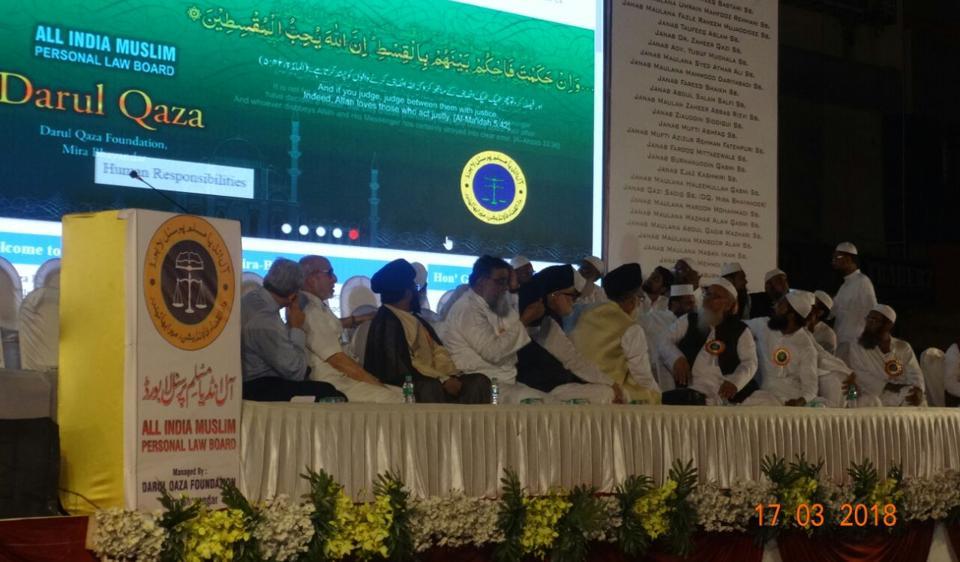The modern state has tried to revamp social order and the citizen. Institutions are created to ensure that citizens are respectful of the law, believe in ideas of order and discipline, become economically productive and peacefully coexist. The recent declaration of AIMPLB to start Sharia Courts or Darul Qazas in every district as a forum for conciliation and amicable settlements of disputes in the Islamic spirit has kicked the hornet’s nest.
The Constitution’s Article 25 guarantees individual freedom of conscience and Article 26 grants freedom to every religious denomination to manage its own affairs “in matters of religion”. But for personal matters, Muslim citizens are governed by the Muslim Personal Law, 1937.
Personal laws are not exclusive to Muslims. The Parsi Marriage and Divorce Act of 1936 lays out rules for the Parsis. The Hindu Marriage Act, 1955 codifies laws related to Hindu marriage, later amended to include laws on divorce and separation. The Special Marriage Act, 1954 provides for marital laws irrespective of the religion. Darul Qazas assume importance for setting up pre-litigation mediation on personal laws, after which the disputants can appeal to law courts, if dissatisfied, for the settlement of personal matters under the secular law
Sharia: Meaning and History
Sharia is understood as divine guidance which functions on imbibing morality as legality. Sharia includes everything from personal conduct, to marriage and more.
In the spirit of Quran and the teachings of the Prophet, Caliph Umar promulgated a number of ordinances and regulations pertaining to family, crime, and ritual including punishment for adultery, theft, temporary marriage.
The Arbitrators and the Three Guiding Principles: The Quran, Sunnah, and Considered Opinion.
Arbitrators were wise and skilled men, those who were approached for adjudication of disputes. Even at that time verdicts were not binding, though disputants usually conformed to their findings. The caliphs were often consulted and socio-customary laws taken into account. Legal Specialists and trained jurists were often consulted though they were not permanent members.
Sharia Law and India
Under the colonialists, the secular Nizammiya Courts acquired significance. The Hastings Plan legally redesigned India but qazis continued to be consulted. By 1857, Sharia, was rigidified and followed as the doctrine of stare decisis. The Shariat Application Act, 1937 mandated that in matters of personal dispute, the state shall not interfere. Though legal history reflects that this position is not unchangeable, even today, the Supreme Court cannot supplant its own interpretations over scriptures.
Muslim Arbitration Tribunals exist in many countries where different religious laws are allowed. Personal disputes can only be guided by religious laws. Post the declaration of Instant Triple Talaq as unconstitutional, these Arbitration Councils have assumed necessity for the purpose of mandatory conciliation in the light of Quran because all Islamic nations that have abolished the practice, have given the mandate for the declaration of Talaq to Darul Qazas.
Also Read: Delhi power tussle: law, politics, constitution and legality
Darul Qazas are not recognized at par with courts established by the law. But their judgments carry moral and cultural weight. Their verdicts are applicable to those who are convinced. The recent petition, Vishwa Lochan Madan v Union of India, to declare Darul Qazas illegal was dismissed. The Supreme Court observed that the grievance of running a parallel judicial system is misconceived. And Article 44 of the Constitution, which envisages a Uniform Civil Code remains as an unenforceable directive principle.
The SC asserted, “A Fatwa is an opinion, not a decree, not binding on the court or the State or the individual”. This does not mean that the existence of Darul Qazas or issuing Fatwas are illegal. “It is an informal justice delivery system with an objective of bringing about an amicable settlement between the parties. It is within the discretion of the persons concerned either to accept, ignore or reject it.”
Abuse of Rights?
The ignorant and weak fall prey to coercion and unequal treatment and are bullied out of their rights. Often women fail to obtain a divorce because they have to waive off the Mehr. Non-binding judgments allow recourse to courts of law. For this a protective measure could be to appoint to the Darul Qazas’ qualified lawyers and one Islamic law expert in each case, to ensure that an amicable decision can be reached upon, which is compliant with both secular and religious law, to the satisfaction of the parties. In cases where courts of law are approached, the proceedings before the Darul Qaza will show the intent and conduct of the parties.
‘Talaq’ to be part of syllabus in Madarsa of UP
The fears of a parallel legal system are unfounded. We also need more information to understand the importance of Darul Qazas on the ground, and the experiences of people using them.
In personal matters, many want to settle disputes through a fair arbitrator without state intervention. Darul Qazas will be places of reconciliation, mediation, guidance and direction within the framework of the Indian constitution.
Disclaimer: The opinions expressed in this article are the personal opinions of the author. The facts and opinions appearing in the article do not reflect the views of NEWSD and NEWSD does not assume any responsibility or liability for the same.


















